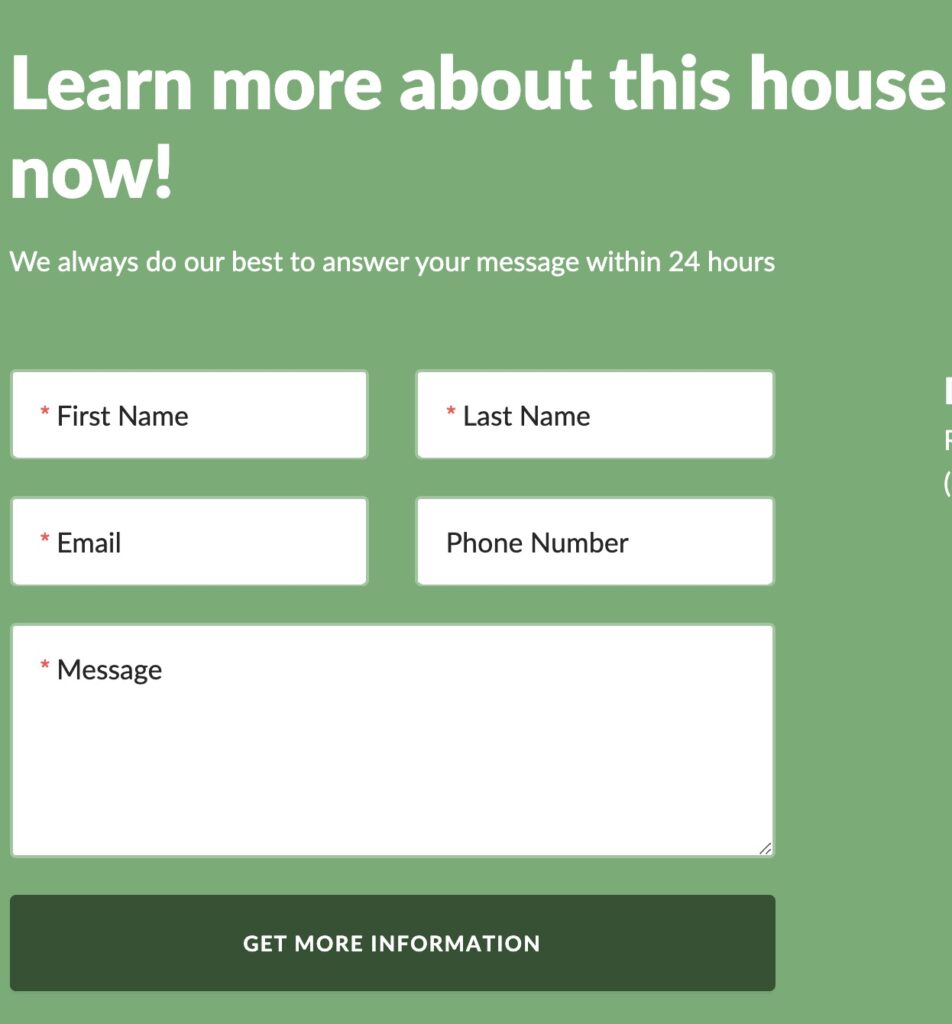Landing Pages for Realtors
What is a landing page? A landing page is a single web page with a specific goal or call-to-action (CTA). Also known as a “lead capture page,” an effective landing page helps generate valuable leads by capturing details like email addresses and phone numbers through inquiry forms. Real estate agents should use landing pages to promote their listings and find potential clients.
There are several types of landing pages agents can add to their real estate marketing strategy. For instance, you can have a single property website landing page promoting your client’s listing. You can also use a landing page to offer a free ebook on “how to sell your home fast” or “how to buy a house in today’s market.”
Regardless of the type of landing page you publish, it should always have a lead capture form for building your email list.

This article details how landing pages work and the benefits of creating a landing page for your real estate business.
How do landing pages work?
The premise of a landing page is simple and incredibly effective. Ultimately, a landing page works by attracting viewers and incentivizing them to fill out a lead form.
Here’s a simple breakdown of how a landing page works:
- A prospective customer lands on the page through social media, a search engine, or an ad
- The landing page provides valuable information and a CTA
- The prospect fills out the form and gets added to your database
- You market and nurture the lead through email campaigns and social media channels
Remember, a landing page should only display information about the specific offer or CTA. The goal is to provide enough information on the product or service benefits to entice the viewer to fill out the inquiry form.
Showcase your listings in detail
Real estate agents should use landing pages to promote their listings as single property websites. With a listing website, the buyer can view real estate images of a single listing without all of the distractions that come with third-party websites.
Your listing is front and center when featured as a landing page. On a single property website, your listing details are easily visible to potential buyers, and they can quickly contact you through the built-in lead gen form.

Some landing page builders make it easy for agents to house their professional real estate photos, virtual tours, and listing descriptions. For example, Virtuance offers all clients a free landing page builder through the Marketing Suite.
Click here to learn more about how the Virtuance Marketing Suite can help you promote your listings and generate more leads.
Grow your email subscriber list
You can quickly grow your email marketing list through landing pages designed for your target customers. While single listing websites should be necessary landing pages for real estate agents, other types of landing pages can attract your target market.
Consider creating a landing page that promotes a free guide on hiring a real estate agent or a free ebook on the homebuying process. Many prospects are first-time buyers or sellers. Likely, these potential clients search online for educational guides before they hire an agent.
It’s challenging to grow an email subscriber list through your landing page if no one sees it. Always make sure that your landing page follows the proper search engine optimization protocol. To learn more about search engine optimization, take a look at this article.
Additionally, you want to promote your landing page through social media channels like Facebook and Instagram. Lastly, if it’s in your budget, purchase a sponsored ad for your landing page on sites like Facebook, Google, and Zillow.
If you’re a real estate agent looking to maximize your marketing efforts, consider building landing pages. A landing page boosts conversion rates and can turn potential customers into lifelong clients.
By adding landing pages to your marketing strategy, you significantly improve your chances of generating valuable leads and growing your real estate brand.








